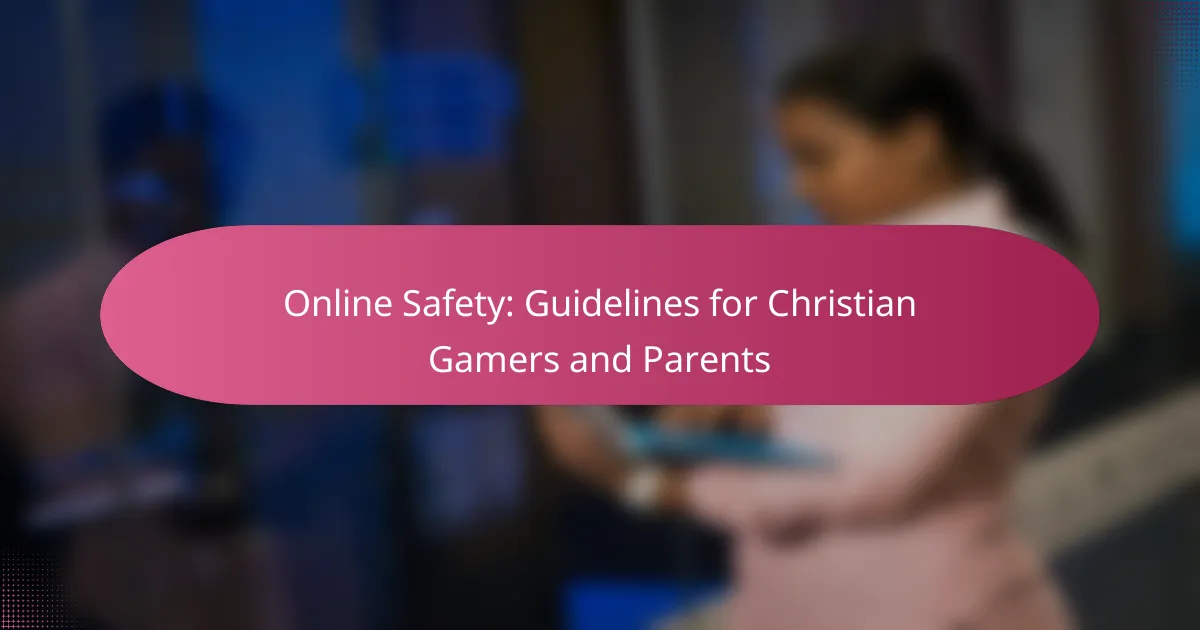In today’s digital age, online safety is a crucial concern for Christian gamers and their families. By implementing best practices such as setting parental controls, fostering open communication, and educating about online risks, families can create a secure gaming environment. Understanding the potential dangers, like exposure to inappropriate content and online bullying, empowers parents and gamers to make informed choices that align with their values.

What are the best practices for online safety for Christian gamers?
Best practices for online safety for Christian gamers include setting up parental controls, fostering open communication, educating about online risks, and promoting positive gaming communities. These strategies help create a secure and supportive gaming environment for players of all ages.
Implement parental controls
Parental controls are essential tools that allow parents to manage their children’s gaming experiences. These controls can restrict access to inappropriate content, limit playtime, and monitor online interactions. Most gaming platforms offer built-in parental settings that can be customized according to the child’s age and maturity level.
To effectively implement parental controls, parents should familiarize themselves with the specific features available on each gaming console or platform. Regularly reviewing and updating these settings ensures that they remain effective as children grow and their gaming habits evolve.
Encourage open communication
Encouraging open communication between parents and children about gaming fosters trust and understanding. Parents should create a safe space for their children to discuss their gaming experiences, including any negative interactions or concerns. This dialogue can help identify potential issues early on.
Regular check-ins about gaming habits can also help parents stay informed about the games their children play and the friends they interact with online. Discussing the values of kindness, respect, and integrity in gaming can reinforce positive behavior in virtual environments.
Educate about online risks
Education about online risks is crucial for both gamers and parents. Gamers should be aware of potential dangers such as cyberbullying, online predators, and exposure to inappropriate content. Parents can help by discussing these risks and providing guidance on how to navigate them safely.
Utilizing resources such as online safety workshops or educational websites can enhance understanding. Encourage children to think critically about their online interactions and to report any suspicious behavior to a trusted adult.
Promote positive gaming communities
Promoting positive gaming communities can significantly enhance the gaming experience for Christian gamers. Parents should encourage their children to engage with communities that reflect their values, such as those focused on teamwork, respect, and inclusivity. Many games have forums or groups dedicated to fostering a positive environment.
Joining gaming groups that emphasize Christian values can provide a supportive network for players. Parents can assist by researching and recommending games and communities that align with their family’s beliefs and encourage healthy social interactions.

How can parents monitor their children’s gaming activities?
Parents can effectively monitor their children’s gaming activities by utilizing various tools and strategies that promote safe gaming environments. This includes leveraging built-in monitoring features on gaming platforms, setting clear time limits, and reviewing game content together to ensure it aligns with family values.
Use gaming platform monitoring tools
Most gaming platforms offer monitoring tools that allow parents to track their children’s gaming habits. These tools can provide insights into the amount of time spent gaming, the games played, and interactions with other players. Familiarize yourself with the settings available on platforms like Xbox, PlayStation, and Nintendo Switch to take advantage of these features.
For example, Xbox Live allows parents to set restrictions on who can communicate with their children and what types of games they can access. Utilizing these tools can help ensure a safer gaming experience while keeping parents informed about their child’s online activities.
Set time limits and schedules
Establishing time limits and gaming schedules is crucial for maintaining a healthy balance between gaming and other activities. Consider setting daily or weekly limits based on your child’s age and responsibilities, such as homework and chores. A common approach is to allow one to two hours of gaming on weekdays and a bit more on weekends.
Using a timer can help enforce these limits. Encourage your child to take breaks during gaming sessions to promote physical activity and social interaction outside of the screen. This practice can prevent excessive gaming and foster a more balanced lifestyle.
Review game content together
Parents should actively review the content of the games their children play to ensure they are appropriate and align with family values. This can involve checking ratings from organizations like the Entertainment Software Rating Board (ESRB), which provides guidance on age-appropriateness and content descriptions.
Engaging in discussions about the games can also be beneficial. Ask your child about their favorite games, what they enjoy about them, and any interactions they have with other players. This not only helps parents stay informed but also opens up opportunities for teaching moments about online behavior and ethics.

What are the potential risks of online gaming for Christian families?
Online gaming presents several risks for Christian families, including exposure to inappropriate content, online bullying, and the potential for addiction. Understanding these risks can help parents and gamers make informed decisions about their gaming experiences.
Exposure to inappropriate content
Inappropriate content in online games can include violence, sexual themes, and strong language, which may conflict with Christian values. Parents should be vigilant about the games their children play and check ratings and reviews to ensure they align with family beliefs.
Utilizing parental controls and content filters can help limit exposure to unsuitable material. Engaging in conversations about the content of games can also provide opportunities for teaching and reinforcing family values.
Online bullying and harassment
Online bullying and harassment are significant risks in the gaming community, where anonymity can lead to negative behavior. Christian families should educate their children about recognizing and reporting bullying, as well as the importance of treating others with respect.
Encouraging open communication about gaming experiences can help children feel safe discussing any negative interactions. Setting clear expectations about online behavior and monitoring interactions can further protect against harassment.
Addiction and excessive screen time
Addiction to gaming can lead to excessive screen time, impacting physical health, social skills, and academic performance. Parents should establish clear time limits for gaming to promote a healthy balance between gaming and other activities.
Encouraging alternative hobbies and family activities can help reduce the risk of addiction. Regularly discussing the importance of moderation and the potential consequences of excessive gaming can reinforce healthy habits.

What resources are available for Christian gamers and parents?
Christian gamers and their parents can access a variety of resources designed to promote safe and responsible gaming. These resources include faith-based organizations, online workshops focused on safety, and community support groups that provide guidance and encouragement.
Faith-based gaming organizations
Faith-based gaming organizations offer a platform for Christian gamers to connect and engage in gaming that aligns with their values. These groups often provide resources such as game reviews, recommendations, and forums for discussion. Examples include organizations like Extra Life and Christian Game Developers Conference, which focus on creating a positive gaming environment.
Participating in these organizations can help gamers find like-minded individuals and foster a sense of community. They often host events, tournaments, and discussions that emphasize faith and fellowship within the gaming context.
Online safety workshops
Online safety workshops are essential for educating both gamers and parents about the potential risks associated with gaming. These workshops typically cover topics such as privacy settings, recognizing online predators, and managing screen time effectively. Many organizations offer free or low-cost webinars that can be attended from home.
Parents should look for workshops that provide practical tips and strategies for monitoring gaming activities. Engaging in these sessions can empower parents to create a safer online environment for their children.
Community support groups
Community support groups are valuable for sharing experiences and advice among Christian gamers and their families. These groups can be found on social media platforms or through local churches, providing a space for discussions about gaming challenges and successes. They often facilitate meetups and online chats to foster connection.
Joining a support group can help parents feel less isolated in their concerns about gaming. It also allows gamers to share resources and strategies for navigating the online gaming landscape while staying true to their faith.

How can Christian values shape gaming choices?
Christian values can significantly influence gaming choices by guiding players toward content that aligns with their beliefs and promotes positive behavior. By prioritizing games that reflect moral teachings and foster community, gamers can create a more enriching experience.
Choosing games with positive messages
Selecting games that convey uplifting themes and ethical lessons is essential for Christian gamers. Look for titles that emphasize virtues such as kindness, honesty, and perseverance. Games that include narratives promoting friendship and moral dilemmas can encourage players to reflect on their values.
Consider checking game ratings and reviews for insights into the content. Platforms like Common Sense Media provide detailed evaluations that can help identify games with appropriate messages. Avoid titles that glorify violence or unethical behavior, as these can conflict with Christian teachings.
Encouraging teamwork and cooperation
Games that promote teamwork and cooperation align well with Christian values of community and fellowship. Multiplayer games that require collaboration can help players develop communication skills and foster friendships. Look for cooperative gameplay mechanics that encourage players to work together toward common goals.
Examples include games that feature team-based objectives or challenges that necessitate collaboration. Encourage participation in community events or guilds, which can enhance the sense of belonging and shared purpose. Avoid competitive environments that may lead to negative behaviors like hostility or exclusion.
